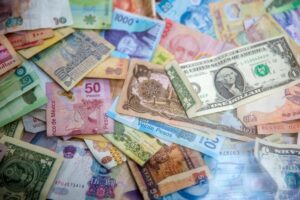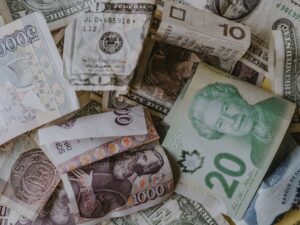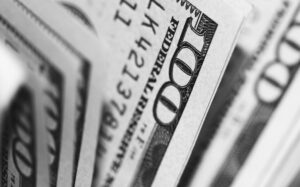What Is FOREX (Foreign Exchange) Trading?

“This post may contain affiliate links. If you use these links to buy something we may earn a commission but you may gain some knowledge.”
This article is a brief overview of what Forex (Foreign Exchange) trading is for beginners. Currency trading is a simple idea to grasp but a very complex concept to put into practice. There are many factors to look at to gain an idea of what might happen to a currencies value.
The foreign exchange market, which is also known as FX or Forex is the world’s most traded market with around $6.6 trillion traded every day. To gain a perspective on this, the New York Stock Exchange will trade approximately $169 billion per day, this is a large sum, but a very small fraction of what is traded in currencies.
The Forex market is open 24 hours a day, 5 days a week. It is traded by institutions, banks and individual traders throughout the world. Unlike publicly traded companies and most other financial markets, there is not a centralized marketplace for Forex trading. Currencies are traded over the counter in whatever market is open at that time.
How Forex Trading works
In trading Forex, traders attempt to profit by buying and selling currencies simultaneously. They do this by buying one currency and selling another at the same time. The reason for doing this is the trader is speculating on the direction the currency is going to take in the future. If a country makes a major announcement about the direction it is going to go, the value of their currency can be affected by this and traders will try to use this information to trade that countries money in the same way people do with publicly traded companies.
A Brief History of the Market
The FOREX market as we know it today is relatively new, but the concept as a whole has been occurring ever since nations have been creating their own currencies. Ever since the adoption of the Bretton Woods system in 1971, most of the worlds major currencies have been available to trade against one another. All currencies have different values at any given time, giving the need to be able to exchange them for different purposes.
Most currency exchanges take place by commercial and investment bank on behalf of their customers but there is a large market of individuals and professional investors that look to make a profit as well.
Forex Market Differences
There are Fewer Rules
The market is not as highly regulated as other markets so traders are not held to as strict of standards or regulations as the futures, options and stock markets. There is no central regulating body that oversees the market as a whole. You are able to short-sell any time because you are not really shorting anything because when you sell a currency you are buying another currency.
Fees and Commissions
Brokers fees and commissions will vary depending on who you decide to trade through, most brokers make their money by marking up the spread on currency pairs. Some brokers charge a commission based on the volume of the trade and other will use a combination of both methods.
Full Access
The market is open somewhere in the world at any given time during the day giving you access to trade 24 hours a day, 5 days a week, there is still not trading on the weekends and holidays.
Leverage
In the United States the Forex market allows for leverage at a 50:1 ratio, in many other parts of the world it can be as high as 100:1. This means that a trader with with an account of $100 can buy and sell as much as $5,000 in currency. This can be both a blessing and a curse as it can amplify both profits and losses so you really need to learn what you are doing or you can get in a deep hole very quickly.
Spot Market
In the Spot Market, currencies are exchanged and traded at their current face value. Like most markets, this price is determined by supply and demand. The biggest factors driving demand are current interest rates, current political situations, economic performance, and of course perception of one currency against the other. When a deal is reached, this is known as a “Spot Deal”.
This is a bilateral contract in which on party will deliver an agreed-upon currency amount to the other party and receive an agreed upon amount of another currency at the agreed-upon exchange rate. These deals are settled in cash and are usually settled within a few days.
Forwards Market
In the Forwards Market, two parties deal in contracts the represent claims to different currency types. They do not trade in actual currencies. The contracts will specify a price per unit and a future date for settlement. These contracts are exchanged Over The Counter (OTC) between the two parties who determine the terms between themselves.
These contracts are binding and are usually settled for cash at the exchange upon execution of the contract. Contracts can be bought and sold before they expire which can make things very interesting. Large corporations tend to use these markets in order to hedge against fluctuations in future exchange rates, but many speculators take advantage of these markets as well.
Futures Market
The Futures Market in the United States is regulated by the National Futures Association. These contracts are bought and sold based on standard size and settlement date. They are typically traded on public commodities markets such as the Chicago Mercantile Exchange.
Futures contracts have very specific details which include, delivery and settlement dates, the number of units being traded, and minimum price increments that can’t be customized. The exchange provided clearance and settlement and acts as a counterpart to the trader.

Forex for Hedging
Forex trading allows businesses that operate or buy and sell goods outside their domestic market the ability to hedge currency risk due to fluctuations in a currencies value. They accomplish this by trading currencies on the forward or swap market which locks in the exchange rate. An example would be, a United States company plans to sell coffee makers in Germany and the current exchange rate between the dollar and euro is $1 to €1.
If the coffee maker costs $100 to manufacture and the company plans to sell it in Germany for €150, then the company stands to make $50 profit if the exchange rate stays even. Unfortunately in most instances this will not be the case. What happens if the dollar grows stronger and the exchange rate changes to .80, which means it now costs $.80 to buy €1.00.
The problem that we run into here is that it still costs the same $100 to produce the coffee maker in the Unites States but can still only sell it for €150 in Germany. When the company brings this money back home and converts it to dollars they only make $20 instead of the $50 with an even exchange rate. This is calculated by (€150 X .80 = $120).
If the coffee maker company had shorted the euro by buying dollars when they had an equal exchange rate they could have reduced their risk. By doing this, if the dollar had increased in value their profit from the trade would have offset their reduced profit from the sale of the coffee makers. On the other hand, if the dollar had decreased in value the higher exchange rate would increase the profit from the sale of the coffee makers which in turn would offset the loss from the currency trade.
The advantage of hedging in this way is that futures contracts are standardized and cleared by a regulating authority in the futures market. The downside is that they may be less liquid than the forward markets which are not standardized and occur within the inter-bank system all over the world.
Forex for Speculation
There are many factors that affect supply and demand of currencies which creates a great deal of volatility in the FX market. A few examples would be trade flows, economic strength, interest rates and geopolitical risk. However, if you are able to put these pieces together and determine which direction a currency is going to move it provides you an opportunity to profit from this volatility. You can look at it this way, if one currency is expected to decrease in value you can assume that the other currency with increase in value because currencies are traded as pairs.
Forex Trading Risks
Trading currencies is a very complex and risky venture. The majority of the markets that trade currencies have varying degrees of regulation and are not standardized. There are even some parts of the world that aren’t regulated at all.
The market is made up of banks that trade with each other all around the world. The banks are the ones that determine the risk they are willing to accept and develop their own processes that they feel keeps them safe as a self regulating body that impose these regulations on all participating banks.
Want to Learn How to Trade Currencies? [Click Here]

Pros of Trading Forex
One of the biggest pros of the Forex market is your ability to get in and out. The Forex markets have the largest daily trading volume of any market in the world. This makes it incredibly easy to get in and out of your trade fast.
The Market is traded 24 hours a day, five days a week and the major trading centers across the world are Singapore, Tokyo, Hong Kong, Sydney, Paris, London, Frankfurt and New York. The markets begin every day in Sydney and end in New York.
Challenges of Trading Forex
Due to the amount of leverage that banks, brokers, and dealers allow in the Forex market, some in the range of 100:1, traders need to understand how this leverage works and the risk that is associated. Leverage allows traders to hold large positions without having a lot of their own cash in a trade which is a great benefit to the trader but can also cause brokers to become insolvent unexpectedly.
In order to be a productive Forex trader takes a great understanding of both economic fundamentals and indicators. You need to be able to understand the larger scope of the world economic situation and how different countries are connected in the areas that drive currency values.
The Bottom Line
For traders with limited funds, just like in the stock market, day trading and swing trading in small amounts is usually your best option and is often easier than the stock market. If you are looking for a more long term, larger fund investment, then a fundamental based or carry trade may be more profitable. The bottom line is that focus and understanding of the macroeconimic fundamentals that drive currency values along with technical analysis are a must for anyone looking to trade in the Forex Market. I hope this gives you a better understanding of what is Forex (Foreign Exchange) Trading.

